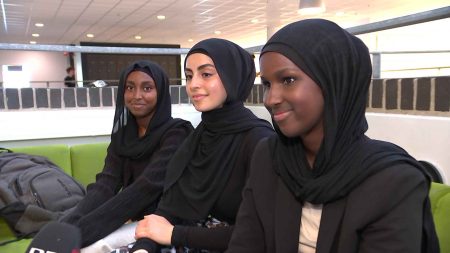This website uses cookies to improve your experience. We'll assume you're ok with this, but you can opt-out if you wish. Read more
Erecting and dissecting barriers to entry
Erecting and dissecting barriers to entry
Last week I wrote about the Social Democratic administration’s attempt to compete for the law and order vote. As usual, this was done by getting tougher on gang crime, understood as ethnic minorities who haven’t become integrated into mainstream society. A few other recent initiatives on immigration and integration are also proving difficult to implement.

Danish teenagers with headscarves. Photo: (C)DR Nyheder.
First, the administration has been working on a project to set up a reception facility for asylum seekers in Rwanda (DK), the same place where the UK is pursuing a similar plan. Immigration and Integration Minister Kaare Dybvad (DK) recently visited Kigali, the capital, to sign an agreement to open an office that will foster collaboration with Rwanda on issues related to climate and corruption as well as asylum and migration. Dybvad believes that the plan can be settled before next summer and that it would set an example for other European countries. A joint EU policy could then put an end to illegal refugee trafficking across the Mediterranean.
But is it legal?
The administration lacks backing for the measure from its own supporting parties, however. The Social Liberals have threatened to withdraw support from the administration if it opens the facility, and now the Red-Green Party has announced that it will never vote to approve the project (DK). Party Chair Mai Villadsen called the initiative a “phantom project” whose only purpose was “to send a lot of external signals.” That characterization is reminiscent of former Integration Minister Inger Støjberg’s placement of notices discouraging refugees in Middle Eastern newspapers during the Syrian migrant crisis.
Critics point to questionable human rights observance in Rwanda and doubt whether conditions in a reception center would meet international human rights conventions. That has apparently become a stumbling block for the UK, which has already set up a facility and had expected to send the first asylum seekers there by now. Since the Social Liberals have demanded an election this year, the Social Democrats may be out of office before a deal with Rwanda is even possible.
Rapunzel, Rapunzel!
The second measure, domestic in scope, is also symptomatic of Denmark’s slow-moving consensus politics. The administration appointed a commission earlier in the year: The Commission for the Forgotten Women’s Battle (Kommissionen for den glemte kvindekamp). Its purpose was to investigate how to prevent social control of women and girls in immigrant subcultures. Last month it issued some recommendations, the most controversial being a ban on headscarves in schools (DK). The objective is to stop girls from being divided into two camps, the proverbial “us and them.” Danish elementary schools run up to the ninth grade, and the ban would apply to all of them in the country, including private and Muslim schools.
The commission is composed of a broad selection of public officials, researchers, educational professionals, and other citizens. It didn’t furnish figures on how many girls are pressured by their parents to wear headscarves. Nor did it take a position on the display of other religious symbols in schools or offer guidelines on putting the ban into practice.
No volunteers for clothing police
Other researchers, such as Brian Arly, Associate Professor of Sociology of Religion at the University of Copenhagen, are skeptical. Arly doesn’t know of evidence that the measure would reduce social control and thinks it could result in dropouts of up to 15 percent of Muslim girls, as has occurred in France, which implemented such a ban in 2004. The ban would need to be put into law by Parliament and would end up, like the Rwandan halfway house, in the European Court of Human Rights.
The announcement caused a stir in the media. One of the main problems with the measure is assigning responsibility for enforcement, which school principals and teachers are of course reluctant to take on. Two commission members now want to reconsider the proposal (DK). They suggest that older pupils could be allowed to decide for themselves whether to wear headscarves or that the policy could be amended to a recommendation against them rather than an outright prohibition. Even the center-right Liberal Party mayors have taken a clear stand against the policy (DK). So the proposal is back on the drawing board.
Love v. bureaucracy
The third example concerns a reform of the spousal reunification policy (DK) that was adopted by Parliament in 2018. The rules made it more difficult for Danish citizens to bring foreign spouses to Denmark. A new report from the Ministry of Immigration and Integration on its consequences brought to light some rather embarrassing facts. One new requirement that led to a rejection of many reunification applications was proficiency in the Danish language corresponding to the ninth-grade level.
To be clear, this refers to proficiency on the part of the petitioning Danish spouse—not the foreign partner. Applicants for naturalized citizenship must take a similar test. The reason for the requirement, according to Matias Tesfaye, Integration Minister at the time, was that citizens from ethnic minorities sometimes did not have Danish skills sufficient to facilitate integration.
Misreading the fine print
Indeed, some 27 percent of minority applicants failed the new language test. The more controversial result, however, was that a full 19 percent of “ethnic Danes” also failed. These include people with well-functioning careers who have never been on public assistance. Other requirements have also posed obstacles for people who otherwise appear to be good candidates to provide for their spouses. The tabloid Ekstra Bladet has tracked down several examples of people who ran into nightmarish problems obtaining bank guarantees, collecting extensive documentation, and enduring long waiting periods.
The report itself was critical (DK) of some of the stringent new rules. The Society of Immigration Rights Lawyers, which contributed to the report, found the language requirement inappropriate in many cases. Minister for Immigration and Integration Kaare Dybvad said a revision of the rules was a possibility that he would discuss with the other parliamentary parties.


